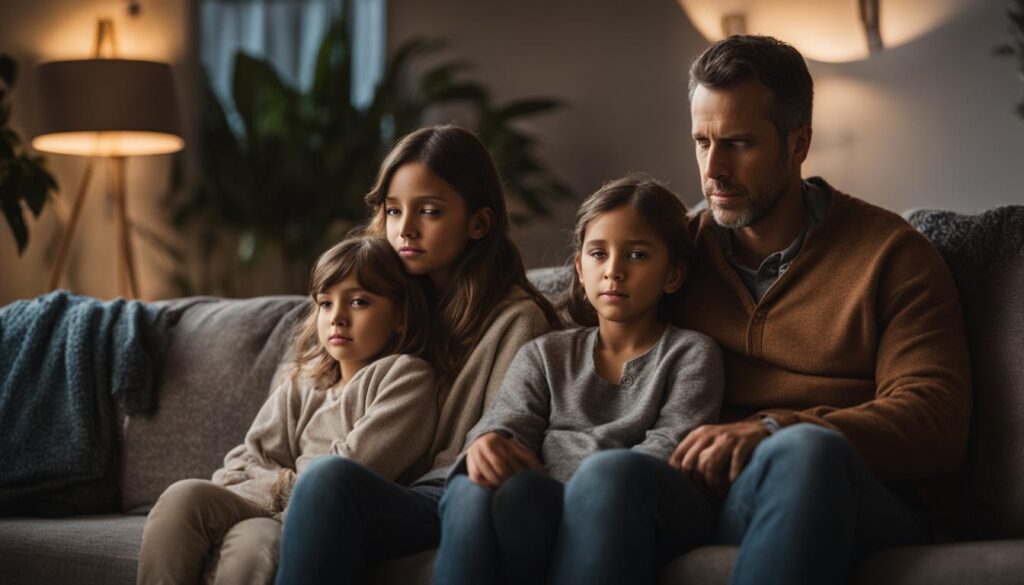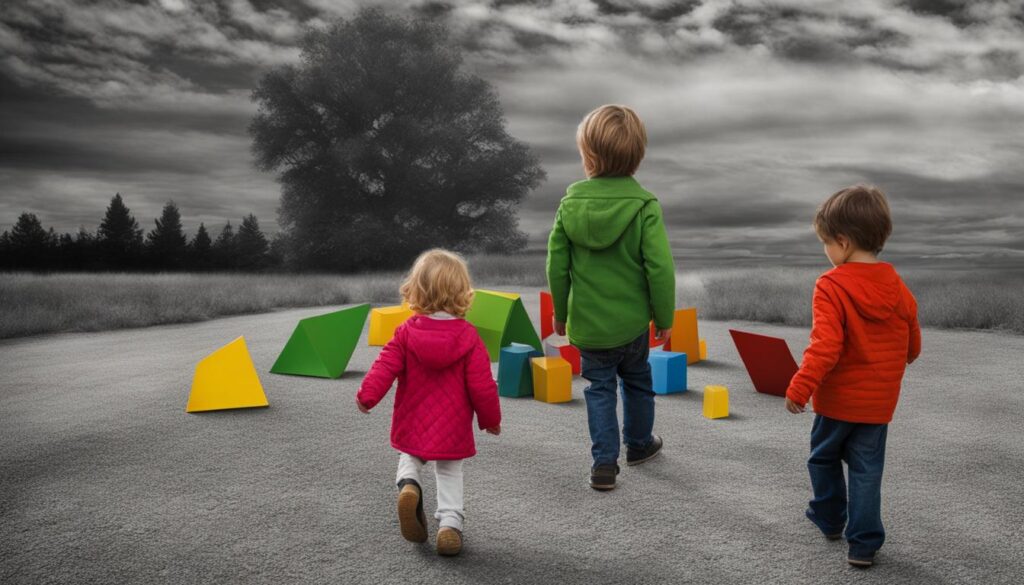Did you know that around 40-50% of marriages in the United States end in divorce? This means that millions of children are faced with the challenges and changes that come with their parents splitting up. Helping children navigate their parents’ divorce and offering them support during these tough times is crucial for their emotional well-being and long-term resilience.
Divorce can be overwhelming for children of all ages, but there are steps that parents can take to help them navigate this journey with understanding and care. By providing support, open communication, stability, and seeking additional resources, parents can create a positive environment for their children to cope and adjust.
Key Takeaways:
- Divorce affects a significant percentage of marriages in the United States.
- Guiding children through divorce is crucial for their emotional well-being.
- Open communication and support are essential during this challenging time.
- Providing stability and structure helps children feel secure.
- Seeking additional support and resources can make the process easier for both parents and children.
Telling Your Children about the Divorce
When it comes to talking to children about divorce, it’s crucial to approach the conversation with honesty and age-appropriate language. The goal is to provide a child-friendly explanation of divorce that helps them understand the situation without overwhelming them.
Using simple and clear language, explain to your children that the parents can no longer get along. Emphasize that this decision does not change your love for them and reassure them that you will continue to care for them. Let them know that the divorce is not their fault and that they are not alone in facing the changes that lie ahead.
Address any changes that will occur in their lives, such as living arrangements or school, in a calm and reassuring manner. Let them know that you, as their parents, will support them through these changes and work together to make the transition as smooth as possible. By presenting a united front and avoiding blaming the other parent, you can help your children feel more secure and reduce their anxiety.
“Mommy and Daddy have decided that it’s best for us to live in separate houses, but we both still love you very much. We will always be your parents, and we will take care of you no matter what. We understand that this might be hard for you, but we will face these changes together as a family.”
Remember to encourage your children to ask questions and express their feelings. Let them know that it’s normal to feel sad, angry, or confused about the divorce. By creating an environment where they feel comfortable sharing their emotions, you can help them process their feelings and adapt to the changes more effectively.
Addressing Common Concerns
During the conversation, address any common concerns your children may have. Reassure them that both parents will still be involved in their lives and that they will have the opportunity to spend quality time with each parent. Make sure they understand that they are not responsible for the divorce and that it is not their fault.
It’s important to be patient and understanding with your children as they process the news. Reiterate your love and support for them throughout the conversation and beyond. Let them know that you are there to listen to their thoughts and feelings whenever they need to talk.

Talking to your children about divorce is a delicate and sensitive task, but by approaching the conversation with empathy, honesty, and reassurance, you can help them navigate this difficult time with resilience and understanding.
Helping Children grieve the divorce
Divorce can be a significant loss for children, causing a range of complex emotions. It is crucial for parents to provide support and guidance to help their children grieve and adjust to the new circumstances. By addressing their emotions, validating their feelings, and assuring them of continued love, parents can play a vital role in helping children cope with the loss during divorce.
Encourage Expression of Feelings
Supporting children’s emotions starts with creating a safe space for them to express their feelings. Encourage your children to share their thoughts, fears, and concerns without judgment. Let them know that their emotions are valid and that it’s okay to feel angry, sad, or confused. By actively listening and engaging in empathetic conversations, parents can help their children find words to articulate their emotions.
Be Patient with the Process
Grieving is a dynamic and individual process that varies from child to child. Understand that their feelings may change over time and be patient with their journey. Allow them to grieve at their own pace and provide ongoing support as they navigate through different stages of grief. Reassure them that it’s normal to experience a range of emotions and that healing takes time.
By addressing their emotions, validating their feelings, and assuring them of continued love, parents can play a vital role in helping children cope with the loss during divorce.”
Reassure Unconditional Love
Children may blame themselves for their parents’ divorce. It is important for parents to reassure their children that the divorce is not their fault and that both parents love them unconditionally. Emphasize that the decision to divorce was between the adults and does not impact the parent-child relationship. Remind them that they are valued, cherished, and supported by both parents.
Support from External Resources
While parents play a critical role in supporting their children’s grief, seeking additional support can be beneficial. Consider involving a counselor or therapist who specializes in children’s grief during divorce. These professionals can provide expert guidance and help children develop healthy coping mechanisms. Additionally, support groups or community resources may provide valuable outlets for children to connect with peers who are going through similar experiences.
By acknowledging children’s grief, offering empathetic support, and seeking additional resources when needed, parents can help their children navigate the emotional challenges of divorce. Providing a comforting environment and ensuring ongoing communication can contribute to the healing process and help children develop resilience as they adjust to their new family dynamics.

Providing Stability and Structure
Maintaining stability and structure in a child’s daily life is crucial to help them feel secure during the divorce process. By establishing consistent routines and effectively communicating expectations, parents can create a sense of normalcy for their children. This stability can greatly contribute to their emotional well-being and overall adjustment during this challenging time.
Parents can implement various strategies to provide stability for their children. One effective way is to establish regular mealtimes, homework schedules, and bedtime routines. These routines not only offer a sense of structure but also provide a predictable environment for the child. Even though some flexibility may be required, try to maintain the routines as much as possible to create a familiar and stable foundation for your child.
Setting and enforcing rules and limits are also essential in providing stability. Clear expectations and consistent consequences help children understand boundaries and ensure a harmonious environment. This not only promotes their feelings of security but also teaches them valuable life skills, such as responsibility and accountability.
| Key Points | Benefits |
|---|---|
| Establish consistent routines | Creates a sense of normalcy and predictability for the child |
| Communicate expectations | Helps the child feel secure and understand boundaries |
| Set and enforce rules | Promotes a harmonious environment and teaches valuable life skills |
While divorce brings significant changes and uncertainties, maintaining stability and structure can provide a stabilizing force in a child’s life. It offers them a sense of normalcy and control amidst the upheaval. By prioritizing stability, parents can create an environment where their children can thrive and develop resilience.

Taking Care of Yourself
During the divorce process, it’s crucial to prioritize your own well-being so that you can effectively support your children. Self-care is not selfish; it is an essential part of managing stress and maintaining balance. By taking care of yourself, you can navigate the challenges of divorce with resilience and strength.
To manage stress during this difficult time, engage in regular exercise. Physical activity releases endorphins, which can improve your mood and reduce anxiety. Whether it’s going for a walk, practicing yoga, or hitting the gym, find an activity that you enjoy and make it a regular part of your routine.
Eating a healthy diet is another important aspect of self-care. Nourishing your body with nutritious foods will help you maintain energy levels and improve your overall well-being. Make sure to include plenty of fruits, vegetables, whole grains, and lean proteins in your meals. Remember to stay hydrated by drinking an adequate amount of water each day.
Getting enough rest is essential for managing stress and promoting emotional well-being. Aim for seven to eight hours of quality sleep each night. Create a bedtime routine that allows you to unwind and relax before bed, such as reading a book or practicing relaxation techniques.
Seeking support from friends, family, or a therapist can make a significant difference in your ability to cope with the challenges of divorce. Talking about your feelings and concerns with someone who understands can provide emotional relief and valuable perspective. Don’t hesitate to reach out to your support network when you need it.
“Taking care of yourself is not selfish, it’s necessary for your own well-being and the well-being of your children.”
Engaging in self-care activities is crucial for maintaining a sense of joy and fulfillment amidst the stress of divorce. Find time for hobbies or activities that bring you happiness, whether it’s reading, gardening, painting, or playing a musical instrument. These activities not only provide a much-needed break but also promote your overall mental well-being.
Remember, taking care of yourself is not a luxury; it’s a priority. By prioritizing your well-being, managing stress, and practicing self-care, you are better equipped to support your children and navigate the challenges of divorce.

Managing Conflict with Your Ex
In order to promote the well-being of your children, it is crucial to effectively manage and minimize conflict with your ex-spouse. This involves prioritizing open and respectful communication throughout the co-parenting journey. By agreeing in advance on explanations for the divorce and presenting a united front to your children, you can provide them with a sense of stability and understanding.
| Ways to Manage Conflict | Benefits |
|---|---|
| 1. Maintain open and respectful communication | – Promotes a healthier co-parenting relationship. |
| 2. Agree on explanations for the divorce | – Provides children with a unified and consistent understanding of the situation. |
| 3. Seek compromises and shared decision-making | – Fosters a cooperative and harmonious co-parenting environment. |
| 4. Set boundaries and establish routines | – Creates stability and a sense of normalcy for your child. |
Remember, the primary focus should always be on the well-being and emotional security of your children. By implementing effective conflict management strategies, you can provide a supportive co-parenting environment that minimizes stress and promotes healthy development for your child.

Negotiating Agreements
When co-parenting after a divorce, negotiating agreements with your ex-spouse is crucial for creating a healthy and cooperative parenting relationship. By focusing on finding solutions that prioritize the well-being of your child, you can establish a foundation for effective co-parenting. If conflicts arise and communication becomes challenging, seeking mediation or professional assistance can provide valuable guidance and help resolve differences.
It’s important to approach negotiations with a willingness to compromise and take turns making decisions. This shared decision-making process allows both parents to have a voice in important matters concerning their child. By actively engaging in negotiations, you can demonstrate your commitment to the best interests of your child and foster a productive co-parenting dynamic.
Negotiating agreements is an essential aspect of co-parenting after divorce. It allows parents to work together, find common ground, and create a framework that supports their child’s well-being.” – Dr. Emily Peterson, Family Psychologist
Remember that co-parenting is a long-term commitment, and the ability to resolve conflicts in a constructive manner is key. By prioritizing open communication, flexibility, and the best interests of your child, you can navigate co-parenting agreements and ensure a supportive environment for your child’s growth and development.

Collaborative Decision-Making in Co-Parenting
| Benefits | Implementation |
|---|---|
| Encourages cooperation | Establish clear communication channels |
| Promotes shared responsibility | Hold regular co-parenting meetings |
| Reduces conflict and stress | Seek professional assistance if needed |
| Fosters healthy parent-child relationships | Be open to compromise and flexibility |
Seeking Additional Support
During the challenging process of divorce, it’s important for both parents and children to have the right support system in place. Fortunately, there are various resources available to help you navigate this difficult time and provide the necessary assistance for your family’s well-being.
Divorce Support Groups
Consider joining divorce support groups to connect with individuals who understand and can empathize with your situation. These groups provide a safe space for sharing experiences, gaining insights, and receiving emotional support from others who are going through similar challenges. You can find local support groups through community centers, places of worship, or online platforms.
Therapist for Children of Divorce
Professional counseling can make a significant difference in helping children cope with the emotional impact of divorce. A trained therapist can provide a safe and supportive environment where your child can express their feelings and develop healthy coping mechanisms. Look for therapists who specialize in working with children of divorce to ensure they have the expertise and knowledge to address your child’s specific needs.
Resources for Co-Parenting
Co-parenting successfully requires effective communication and collaboration between both parents. Explore resources that can assist you in navigating this aspect of divorce. You may find books, online courses, or workshops that offer practical advice and strategies for positive co-parenting. Additionally, many schools offer programs or services specifically designed to support children from divorced families. Reach out to your school’s guidance counselor or social worker for information on available resources.
Don’t hesitate to lean on your support network, including friends and family, during this challenging time. They can provide emotional support and practical assistance when needed. Remember, seeking additional support is not a sign of weakness, but a proactive step towards ensuring your well-being and the best outcomes for your children.

| Resources | Description |
|---|---|
| Divorce Support Groups | Join local or online support groups to connect with others and receive emotional support during the divorce process. |
| Therapist for Children of Divorce | Seek professional counseling for your child to help them navigate the emotional challenges of divorce. |
| Co-Parenting Resources | Explore books, courses, and workshops that provide guidance on effective co-parenting strategies. |
| School Programs and Services | Inquire about resources and support available for children of divorced families at your child’s school. |
Conclusion
Navigating the divorce process can be challenging for both parents and children. However, by providing support, open communication, and stability, parents can guide their children through this difficult time. It’s important to prioritize the emotional well-being of children and to acknowledge their feelings and experiences.
By establishing consistent routines and clear expectations, parents can help their children cope with the changes brought about by divorce. Modeling calm and avoiding conflict in front of the children can promote a sense of safety and security. Seeking support from friends, family, or a therapist can be beneficial for both parents and children.
Remember, co-parenting is a long-term commitment. Ongoing cooperation, communication, and compromise are essential in creating a healthy co-parenting relationship. By prioritizing the best interests of the child and seeking professional assistance when needed, parents can ensure a smoother transition and help their children develop resilience in the face of adversity.
In conclusion, guiding children through the divorce process requires empathy, patience, and a commitment to their well-being. By providing love, support, and stability, parents can help their children navigate the challenges of divorce and create a brighter future.
FAQ
How can I talk to my children about divorce?
When telling your children about the divorce, it’s important to be honest and keep the conversation age-appropriate. Use simple and clear language to explain that the parents can no longer get along. Reassure your children that your love for them has not changed and that you will continue to care for them. Address any changes that will occur in their lives, such as living arrangements or school, and let them know that you will face these changes together. Avoid blaming the other parent, and present a united front as much as possible.
How can I help my children grieve the divorce?
Divorce can be a significant loss for children, and it’s important to help them grieve and adjust to the new circumstances. Encourage your children to express their feelings and listen to them without judgment. Help them find words to articulate their emotions and assure them that it’s okay to be honest. Understand that their feelings may change over time, and be patient with their process. Reassure your children that both parents will continue to love them and that the divorce is not their fault.
How can I provide stability and structure for my children during the divorce?
Maintaining stability and structure in your child’s daily life can help them feel secure during the divorce. Establish consistent routines and communicate their expectations to your child. This can include regular mealtimes, homework schedules, and bedtime routines. While some flexibility may be necessary, try to stick to the routines as much as possible. Setting and enforcing rules and limits can also provide a sense of stability for your child.
How can I take care of myself during the divorce process?
It’s important to prioritize your own well-being during the divorce process so that you can be there for your children. Engage in regular exercise, eat a healthy diet, and get enough rest to manage stress. Seek support from friends, family, or a therapist if needed. Take time for self-care activities and engage in hobbies or activities that bring you joy. Remember that taking care of yourself is not selfish but necessary for your own well-being and the well-being of your children.
How can I manage conflict with my ex-spouse for the well-being of my children?
It’s important to find ways to effectively manage and minimize conflict with your ex-spouse for the well-being of your children. Focus on maintaining open and respectful communication. Agree in advance on explanations for the divorce and present a united front to your children. Seek compromises and shared decision-making when it comes to co-parenting. If necessary, set boundaries and establish routines for your home to provide stability for your child.
How can I negotiate agreements with my ex-spouse for healthy co-parenting?
Negotiating agreements with your ex-spouse can help create a healthy co-parenting relationship. Focus on finding solutions that benefit the well-being of your child. Seek mediation or professional assistance if necessary. Be willing to compromise and take turns making decisions. Remember that co-parenting is a long-term commitment, and it’s important to prioritize the best interests of your child.
Where can I find additional support during the divorce process?
There are various resources available to support parents and children during the divorce process. Consider joining a divorce support group or seeking professional counseling for yourself and your child. Many schools offer programs or services for children going through a divorce. Reach out to friends and family for support, and don’t hesitate to ask for help when needed. Remember that seeking support is essential for your own well-being and the well-being of your children.
How can I guide my children through the divorce process?
Navigating the divorce process can be challenging for both parents and children. However, by providing support, open communication, and stability, parents can guide their children through this difficult time. Prioritizing children’s emotional well-being and seeking additional support when needed can contribute to a smoother transition and help children develop resilience. Remember that co-parenting is a long-term commitment, and ongoing cooperation and communication are essential for the well-being of your children.










